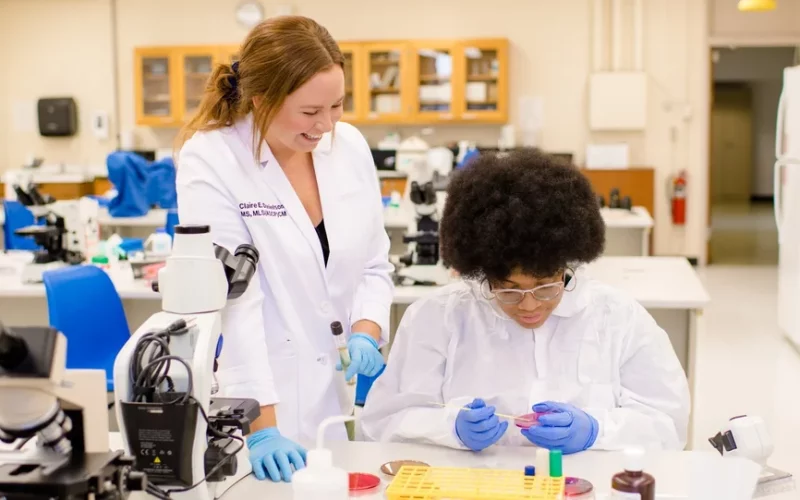Science lab technology plays a pivotal role in advancing research and development across various scientific disciplines. From pharmaceuticals and medical research to environmental science and biotechnology, laboratory technologists ensure that experiments are conducted accurately and efficiently. For individuals interested in pursuing a career in this dynamic field, understanding the roles, opportunities, and key institutions to know is crucial for building a successful career.
Understanding Science Lab Technology Careers
Science lab technologists are responsible for operating, maintaining, and troubleshooting scientific equipment and ensuring experiments are executed according to strict guidelines. These professionals work in diverse sectors such as healthcare, research and development, education, and environmental science. Depending on their area of specialization, they may engage in tasks like analyzing samples, preparing chemicals, recording data, and interpreting results.
Some common roles within science lab technology include:
1. Laboratory Technician: Laboratory technicians are responsible for supporting the work of scientists by setting up and maintaining lab equipment, conducting experiments, and documenting results.
2. Medical Laboratory Technologist: These professionals analyze medical samples, such as blood and urine, to help diagnose diseases and conditions. They are frequently employed in medical centers, testing facilities, or scientific research organizations.
3. Biotechnology Laboratory Technician: Biotechnology lab technicians work with cutting-edge technologies to support genetic research, vaccine development, and other biotechnological innovations.
4. Environmental Science Technologist: These professionals analyze environmental samples, monitor pollution levels, and help ensure compliance with environmental regulations.
5. Pharmaceutical Lab Technician: Pharmaceutical lab technicians support the development and testing of drugs by conducting experiments and ensuring that products meet safety standards.
Educational Pathways
A career in science lab technology typically requires a background in science, particularly in fields such as biology, chemistry, or physics. Many individuals begin their journey by earning a Bachelor’s Degree in Laboratory Technology or Biomedical Science. For those wishing to specialize further, advanced degrees or certifications may be pursued. In some cases, an Associate’s Degree in laboratory technology can be sufficient for entry-level positions.
Lab technologists are also expected to undergo on-the-job training and gain hands-on experience to ensure that they are proficient with the latest technologies and safety protocols.
Key Skills for Success
To excel in science lab technology careers, individuals must possess a blend of technical, analytical, and interpersonal skills. Some of the key skills include:
Attention to Detail: Given the precise nature of laboratory work, lab technologists must be meticulous in their tasks, ensuring that data is accurate and procedures are followed correctly.
Problem-Solving: Lab work often involves troubleshooting equipment malfunctions, adjusting procedures, and ensuring that experiments yield valid results.
Analytical Skills: The ability to analyze complex data and interpret the results is essential for making informed decisions in research and development.
Technical Proficiency: A solid grasp of lab instruments, computer applications, and safety procedures is crucial.
Communication: Lab technologists must communicate their findings clearly with fellow scientists and stakeholders.
Institutions to Know
Several institutions offer specialized programs and certifications for those wishing to enter the field of science lab technology. Whether you’re looking for educational opportunities or organizations that advance research in this field, here are some key institutions to know:
1. American Society for Clinical Laboratory Science (ASCLS): This organization provides professional support to individuals in the field of clinical lab science. It offers certifications, resources, and networking opportunities for laboratory technologists. They also provide educational resources and advocacy for the profession.
2. American Chemical Society (ACS): The ACS is an essential resource for laboratory professionals in chemistry-related fields. It offers certifications, courses, and a wealth of knowledge on chemistry and lab technologies. The ACS is instrumental in advancing innovation in the science lab field.
3. National Accrediting Agency for Clinical Laboratory Sciences (NAACLS): This organization provides accreditation to clinical laboratory programs, ensuring that education and training meet industry standards. For those interested in medical laboratory technology, NAACLS is an essential body to consult for accredited institutions.
4. International Union of Pure and Applied Chemistry (IUPAC): As a global institution, IUPAC plays a role in standardizing the terminology and practices used in laboratory technologies, particularly in chemistry. It is an excellent resource for individuals looking to stay at the forefront of developments in the field.
5. The National Institute of Standards and Technology (NIST): NIST operates as an agency within the U.S. government. Department of Commerce and works on developing and promoting measurement standards. It plays a critical role in ensuring that lab technologies, particularly in the fields of calibration and quality control, meet high standards.
6. The Royal Society of Chemistry (RSC): The RSC is a UK-based professional association that offers resources, training, and networking opportunities for laboratory professionals. It supports chemistry lab professionals through certifications, journals, and events, providing a broad platform for career development.
7. Biomedical Engineering Society (BMES): For those interested in biotechnology and biomedical applications, the BMES is an influential institution. It offers resources for networking, research, and career advancement in the field of biomedical technology, including lab-related careers.
8. European Federation of Clinical Chemistry and Laboratory Medicine (EFLM): The EFLM promotes scientific and professional excellence in clinical chemistry and laboratory medicine across Europe. Its conferences, publications, and networking opportunities are key resources for laboratory professionals.
Career Opportunities and Outlook
The demand for science lab technologists is expected to continue growing in response to advancements in technology, healthcare, and environmental concerns. According to the U.S. According to the Bureau of Labor Statistics, jobs for medical and clinical lab technicians are expected to increase by 11% between 2020 and 2030, significantly outpacing the average job growth rate.
With the increasing reliance on data-driven decisions in fields like biotechnology, environmental monitoring, and medical diagnostics, the role of laboratory technologists will remain essential to scientific progress. As such, science lab technology offers a stable and rewarding career path for individuals with a passion for science and technology.
Conclusion
Science lab technology careers offer dynamic opportunities to work at the forefront of scientific discoveries and innovations. With the right education, skills, and knowledge of key institutions, aspiring professionals can pursue rewarding careers in diverse fields. By engaging with organizations that offer certifications, training, and networking opportunities, they can stay updated with the latest trends and further their expertise. Whether you’re interested in healthcare, biotechnology, or environmental science, the world of science lab technology offers numerous pathways to success.
info by: https://roland.co.id












